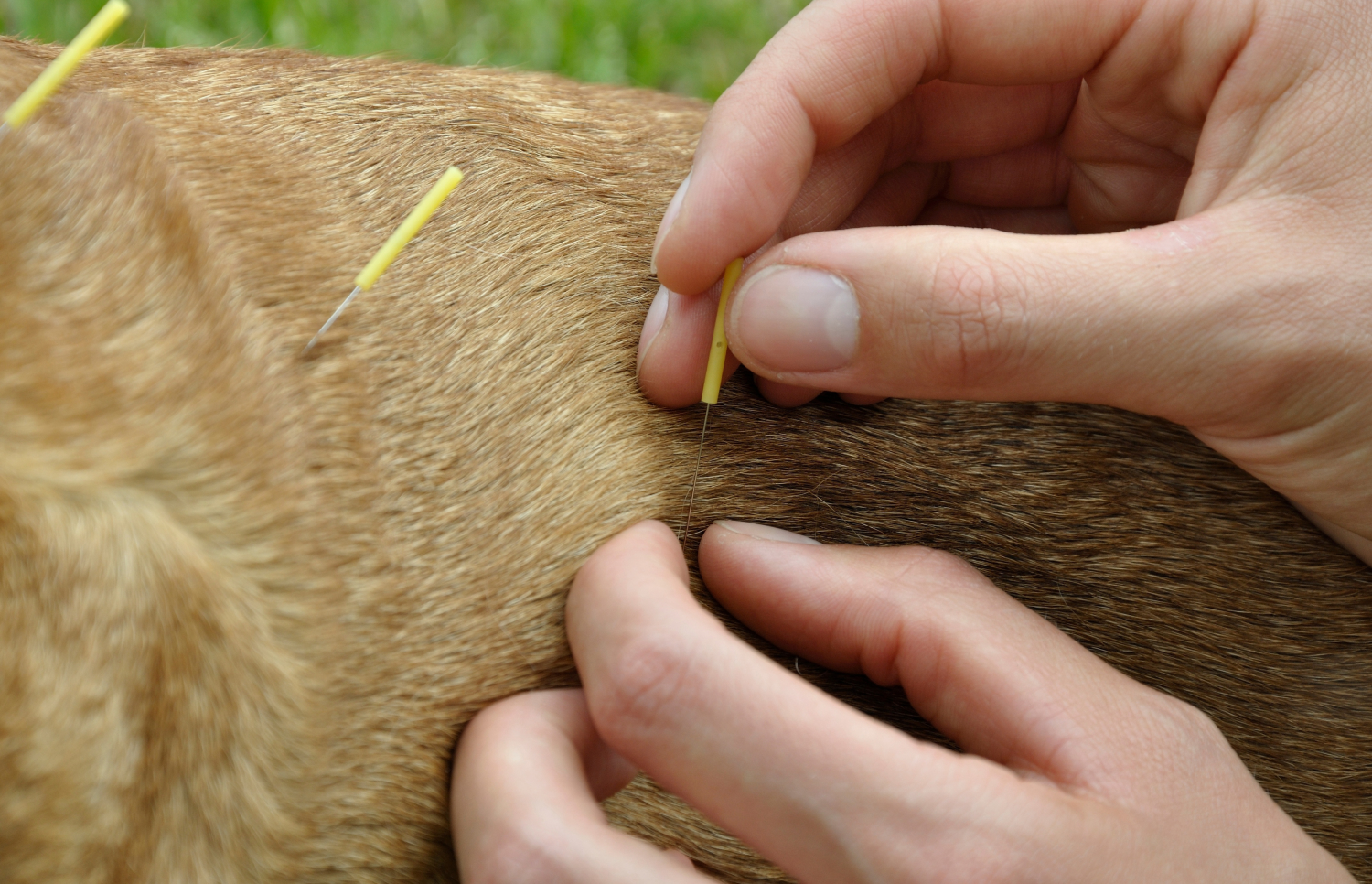You might have heard of acupuncture in the context of treating humans, but did you know that acupuncture can have many benefits when used on dogs? Acupuncture is an alternative medicine practice that can help soothe a variety of ailments, notably arthritis and nerve pain.
When you love your dog, you’ll try anything to ease their pain. If you’ve been looking into alternative medicine practices and have stumbled upon acupuncture, don’t let the needles scare you away. When done by a professional acupuncturist, there’s usually nothing to worry about.
To learn more about what acupuncture is, what it can help treat, and what to expect during the procedure, keep reading!
What Is Acupuncture?
Acupuncture is a traditional Chinese medicine practice where a trained administrator enters fine needles into specific points where nerves and blood vessels converge. These points are called acupuncture points; they’re believed to control the energy transmitted through a body. Much of traditional Chinese medicine is based on the idea that illness is caused by an imbalance of energies within your body.
When the fine needles are inserted into these points, they can help enhance blood circulation and promote healing capabilities. It stimulates the nervous system to release anti-inflammatory substances into the dog’s body to relieve pain. Research suggests that acupuncture could work by modulating the nerve pathways by interacting with nerve fibers in the skin. This activates a release of chemicals, many of which can help alleviate pain.
How Does It Help Dogs?
Acupuncture can help dogs the same way that it helps humans. The process of acupuncture and the outcome won’t be much different because it has the same function. It improves a dog’s blood flow, relaxes muscles, may limit how much pain medication they need, reduces the amount of waste product produced, and helps to increase the metabolic waste the body removes.
There are no real systemic side effects of using acupuncture as a treatment for your dog because it covers a more holistic approach. For dogs in poor health who could be at higher risk when undergoing certain surgeries or using certain medications, acupuncture might prove a suitable alternative.
Let’s review a few of the benefits associated with canine acupuncture.
Conditions Acupuncture May Help
Acupuncture can help soothe the symptoms of multiple conditions, including some of the following:
- Arthritis: Dogs with arthritis and other joint diseases often experience chronic pain and stiffness. Acupuncture helps relax the muscles, rejuvenate the joints, and alleviate some of that pain.
- Nerve pain: Acupuncture could help to alleviate discomfort from pinched nerves or slipped discs.
- Cancer side effects: This treatment can help boost energy and even limit nausea, which can be a side effect of cancer or cancer treatment.
- Gastrointestinal problems: This can work to soothe cases of diarrhea and other symptoms of stomach issues.
- Surgery: Acupuncture can relieve anxiety and pain from surgery.
What Is the Acupuncture Process?
During a typical first acupuncture session, you’ll go over your dog’s overall health, any concerns you have, and what you’d like to focus on with the provider. The provider will conduct a physical exam and then decide what should be treated. Your next few sessions will be where needles are placed, and the treatment begins.
The veterinary acupuncturist will insert needles into specific areas of your dog’s body. Your dog is highly unlikely to even feel this happen and soon should relax as they begin to do their magic. The first session can take up to an hour, but the next few will be anywhere from 20 to 45 minutes. Your vet will come up with a plan of how many sessions a week your dog could benefit from, and then you go from there.
For the most part, even the most nervous of dogs will relax after the needles have been inserted. It’s part of the benefit of acupuncture and often a sign that something is working.
Are There Side Effects?
Most people that want to bring their dog in for acupuncture treatment wonder if there’s anything that can truly go wrong. The most common side effects are soreness and mild bleeding. Sometimes you might notice a bruise at the sight of insertion, but this can easily heal up with some icing and rest.
Dogs with heart conditions, who may be pregnant, or have seizure disorders, should avoid doing electroacupuncture because they may have adverse reactions. Talk with your dog’s primary veterinarian before you begin any other treatments just to keep them updated and to get their opinion on things!
Alternative Methods Are Impactful!
Acupuncture is often where you end up when you’ve tried everything else in the book. Alternative medicine can be really impactful for dogs that have nowhere else to go, but ideally, it should be done in addition to regular veterinary treatment. It can be hard to navigate medical treatment for our pets, especially because they can’t communicate the exact problems that they are having.
Alongside acupuncture, your vet might recommend other alternative methods, such as massaging. If you think about how nice a massage feels for yourself, it’ll be easy to understand how your dog might benefit from it. Many of these alternative methods can be used in conjunction with each other, which can only promote the benefits that they have.
Similarly, some veterinarians may recommend your dog take herbal supplements in addition to their full care plan. Holistic treatments might not be enough to treat your pet, but when used in conjunction with other methods, we can provide our beloved four-legged friends with the best care possible.

Ask Questions With AskVet
With something like acupuncture, you’re bound to have a variety of questions. Even after an acupuncture visit, you might be wondering if your dog is okay or if there are ways to monitor for any reaction. For these questions, you can speak with the experts at AskVet.
When you sign-up with AskVet, you can gain access to our team of veterinary experts and Certified Pet Coaches. Talk to our veterinary experts to discuss your dog’s issues and what you’re doing for treatment. They can offer advice and give you a better picture of what your dog is going through and the process of acupuncture.
If you’re looking to work towards improving your preventative care techniques and setting your dog up for success, AskVet has got you covered. Get started today to gain access to a variety of resources, use our vet chat 24/7, and join a community of pet parents who are all looking out for their pets.
Sources:
Acupuncture | College of Veterinary Medicine | Purdue University
Acupuncture in Veterinary Patients – Management and Nutrition | Merck Manual





